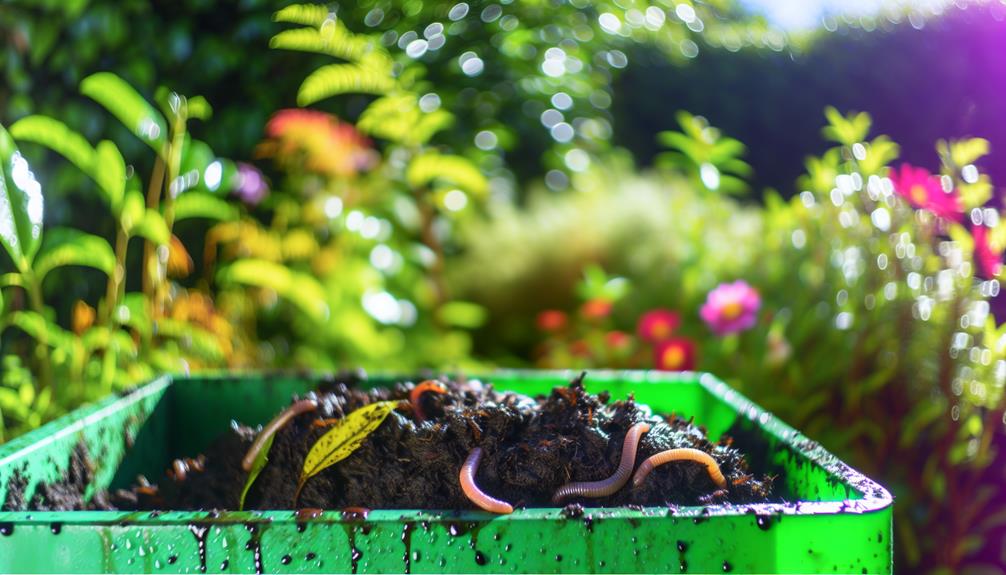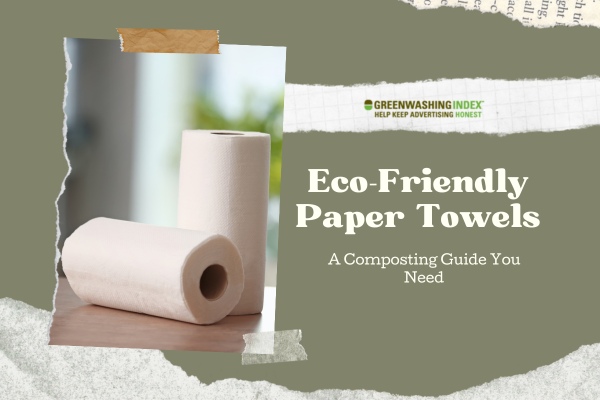Yes, you can compost worms, particularly using a method called vermicomposting. Worms like red wigglers consume organic matter, speeding up decomposition and producing nutrient-rich castings. Keeping your worm bin at an optimal temperature (55-77°F) and moisture level guarantees their health and productivity.
Dead worms decompose naturally, adding further nutrients. To maintain a healthy worm bin, balance green and brown materials, monitor moisture, and avoid overfeeding. If done correctly, vermicomposting can efficiently reduce waste and enhance soil quality. With the right approach, you’ll see how beneficial worms are to your composting efforts.
Role of Worms in Composting
Ever wondered how worms transform your kitchen scraps into rich compost? It’s a fascinating process that combines worm reproduction and compost bacteria to create a nutrient-rich soil amendment.
When you add worms to your compost, they break down organic matter, which accelerates the decomposition process. The worms consume food scraps and other organic materials, digesting them and excreting what’s known as worm castings, or vermicast.
Worm castings are packed with beneficial microbes and nutrients. Worm reproduction plays an important role in maintaining a thriving worm population in your compost. Earthworms are hermaphrodites, meaning each worm has both male and female reproductive organs, allowing them to mate and lay eggs efficiently.
This rapid reproduction helps maintain a steady supply of worms to continue breaking down compost materials.
Additionally, compost bacteria are vital partners in this process. These bacteria help to decompose organic materials, making it easier for the worms to digest them. Together, worms and compost bacteria work collaboratively to transform your kitchen scraps into dark, crumbly compost.
Also Read: Can You Compost Celery?
Worm Lifespan in Compost
Have you ever wondered how long worms live while working in your compost bin? Typically, composting worms, like red wigglers, can live up to a year or longer in an ideal worm habitat. Their lifespan is greatly influenced by the conditions you provide.
First, let’s talk about temperature influence. Worms thrive best in a range of 55-77°F (13-25°C). If temperatures drop too low or climb too high, it can stress your worms, shortening their lifespan. It’s crucial to keep your compost bin in a location where you can regulate the temperature, like a shaded outdoor area or a controlled indoor environment.
Next, consider the worm habitat within the compost bin. Make sure it’s moist but not waterlogged, as worms need a damp environment to breathe through their skin. Regularly check the moisture level by squeezing a handful of compost; it should feel like a wrung-out sponge.
Also, provide a balanced diet of organic waste, avoiding too much citrus or spicy foods, which can harm them.
Signs of Aging Worms
As worms age, you’ll notice their activity levels decrease and their responsiveness to food slow down. You might see them burrow less and exhibit a sluggish demeanor. These signs can indicate that your worms are reaching the latter stages of their lifespan.
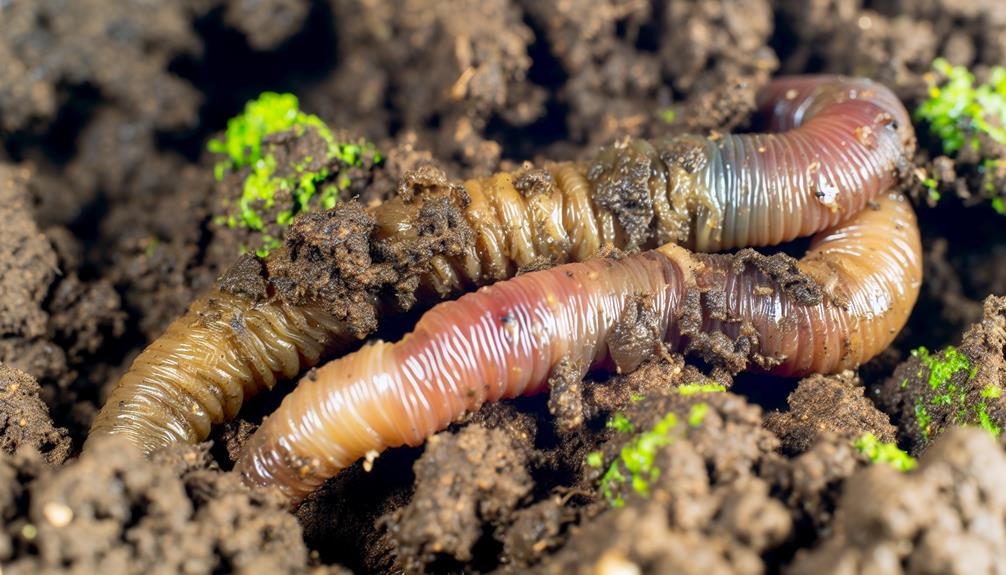
Another telltale sign is changes in their physical appearance. Worm molting, which is a normal part of their growth, becomes less frequent. Older worms often have a duller, more faded color compared to their younger counterparts. They may also look thinner due to a slower metabolism.
Here’s a quick reference table to help you identify aging worms:
| Sign of Aging | Description | Action Needed |
|---|---|---|
| Decreased activity | Less burrowing and movement | Monitor closely |
| Slow response to food | Longer time to consume scraps | Adjust feeding routines |
| Less frequent molting | Irregular shedding of old skin | Observe for health changes |
| Duller color | Faded appearance | Maintain ideal conditions |
| Thinner bodies | Reduced body mass and size | Check for adequate nutrition |
Additionally, you may observe a decline in the reproduction cycle. Older worms produce fewer cocoons and hatchlings, signaling a slowdown in their reproductive capabilities. By recognizing these signs, you’ll better understand how to care for and manage your composting worms effectively.
Also Read: Can You Compost Basil?
Decomposing Dead Worms
When worms die in your compost bin, they naturally break down and contribute to the nutrient-rich compost. This process not only returns valuable nutrients to the soil but also supports the ongoing cycle of decomposition.
Natural Breakdown Process
Dead worms in a compost bin naturally decompose and contribute valuable nutrients back into the soil. This process is essential for maintaining a healthy compost system. When worms die, their bodies break down through microbial activity, which is influenced by temperature regulation within the bin. Proper management guarantees ideal conditions for decomposition, avoiding unpleasant odors and sustaining a balanced ecosystem.
- Temperature Regulation: Keeping the bin at a steady temperature accelerates the breakdown process.
- Microbial Activity: Beneficial microbes thrive in a well-maintained compost bin, aiding in the decomposition of dead worms.
- Moisture Levels: Monitoring and adjusting moisture can prevent the bin from becoming too dry or too wet, both of which can hinder decomposition.
- Aeration: Regularly turning the compost introduces oxygen, which promotes microbial activity and helps break down organic matter, including dead worms.
- Balanced Input: Adding a mix of green and brown materials ensures a nutrient-rich environment for composting.
Nutrient-Rich Compost
Guarantee that worms greatly enrich your compost, providing essential nutrients that enhance soil fertility.
When worms die and decompose in your compost bin, they break down into valuable organic matter. This organic matter boosts the compost quality by adding nitrogen, phosphorus, and potassium—key nutrients that plants need to thrive.
To maximize the benefits, make sure your compost pile is well-maintained. Start by layering green and brown materials. Green materials include kitchen scraps and grass clippings, which add nitrogen. Brown materials like dried leaves and cardboard add carbon.
Worms, once they decompose, contribute to this nutrient mix, enhancing the overall compost quality.
Keep your compost moist but not waterlogged. Proper moisture levels help worms and other microorganisms break down organic matter efficiently. Turn the pile regularly to aerate it, promoting faster decomposition.
This aeration ensures that the nutrients from decomposed worms are evenly distributed throughout the compost.
Worms’ Role in Soil
Worms play a crucial role in soil health by breaking down organic matter, including their own dead counterparts. When worms decompose, they contribute to a dynamic ecosystem that enhances soil quality.
Here’s how worms and their remains benefit the soil:
- Nutrient Cycling: Decomposing worms release essential nutrients back into the soil, promoting plant growth.
- Soil Aeration: As worms burrow, they create channels that allow air to circulate, improving oxygen levels for plant roots.
- Microbial Activity: Dead worms serve as food for beneficial microbes, boosting microbial activity which further breaks down organic material.
- Soil Structure: Worm castings (their waste) bind soil particles together, enhancing soil structure and water retention.
- Biodiversity: A thriving worm population supports diverse soil organisms, creating a balanced and resilient ecosystem.
To maximize the benefits worms bring to your compost or garden, make sure your soil remains moist and rich in organic matter. Avoid using chemical pesticides that can harm worms and disrupt their activities.
Also Read: Can You Compost Barbecue Sauce?
Benefits of Worm Composting
Have you ever wondered how worm composting can transform your kitchen scraps into nutrient-rich soil enhancers? By harnessing the power of worm castings, you can improve your garden’s health and vitality. Worm castings, or worm manure, are packed with essential nutrients that enhance soil fertility. These tiny powerhouses boost nutrient cycling, guaranteeing plants receive a consistent supply of nutrients over time.
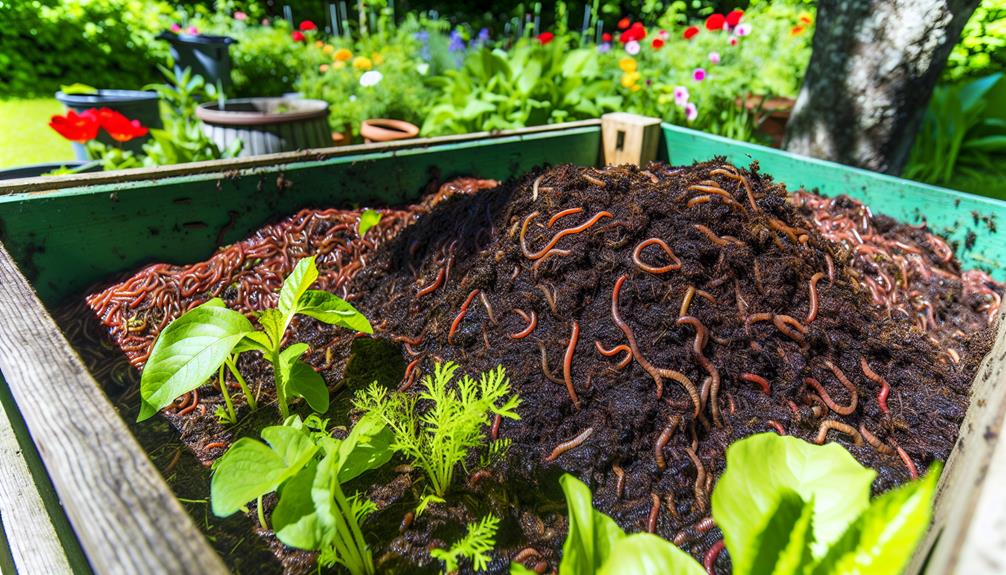
Worm composting isn’t just beneficial for your garden; it’s also an eco-friendly way to manage kitchen waste. Instead of throwing away food scraps, you can let worms break them down into valuable compost. This process reduces landfill waste and lowers your carbon footprint. Plus, it’s a simple and engaging activity that connects you to natural cycles, fostering a sense of belonging to the earth’s ecosystem.
Getting started is easy. You’ll need a worm bin, bedding material like shredded newspaper, and red worms. Add your kitchen scraps, and let the worms do the rest. Regularly harvesting the compost ensures you always have a fresh supply of worm castings for your garden.
Embrace worm composting, and you’ll create a sustainable, thriving garden environment.
Alternatives to Composting Worms
If you’re looking for alternatives to composting worms, consider using a traditional compost bin or implementing beneficial garden practices. A vermicomposting bin isn’t the only way to manage your organic waste effectively.
Methods like hot composting and cold composting can also provide rich, nutrient-dense soil for your garden.
Vermicomposting Bin Essentials
Wondering what alternatives you can use in your vermicomposting bin if you don’t want to rely on worms? Your bin can thrive with a few key essentials that make sure it functions efficiently. Let’s start with the basics of worm bedding and moisture control.
Worm Bedding: Instead of worms, focus on high-quality organic materials for your bedding. This can include:
- Shredded newspaper: Provides a light, airy structure.
- Cardboard: Absorbs moisture well and breaks down slowly.
- Coconut coir: Retains moisture while allowing air flow.
- Peat moss: Maintains aeration and moisture but use sparingly due to acidity.
- Compost: Adds beneficial microorganisms to jump-start decomposition.
Moisture Control: Maintaining the right moisture level is important. Your bin should be as damp as a wrung-out sponge. Too much water can lead to anaerobic conditions, while too little stalls decomposition. Monitor regularly and adjust by adding dry materials like shredded leaves or water as needed.
Beneficial Garden Practices
Instead of relying on composting worms, you can implement several beneficial garden practices to enhance soil health and fertility.
One effective method is compost aeration. By regularly turning your compost pile, you introduce oxygen, which accelerates the decomposition process and produces a richer compost. This practice doesn’t just speed up composting; it also helps reduce unwanted odors and makes your compost more uniform.
Another valuable practice is incorporating natural mulch into your garden beds. Mulch not only retains soil moisture but also adds organic matter as it breaks down, enriching the soil over time. You can use grass clippings, leaves, or even kitchen scraps as mulch. This approach reduces the need for chemical fertilizers and supports a healthier ecosystem.
Additionally, planting cover crops like clover or legumes can greatly benefit your garden. These plants improve soil structure, prevent erosion, and add essential nutrients back into the soil. They can also help manage garden pests by attracting beneficial insects.
Lastly, introducing beneficial insects such as ladybugs or nematodes can naturally control garden pests. These insects prey on harmful pests, reducing the need for chemical pesticides and fostering a balanced garden environment.
Maintaining Worm Bin Health
Ensuring your worm bin stays healthy involves regularly monitoring moisture levels, temperature, and pH balance. Keeping these elements in check helps your worms thrive and efficiently compost your organic waste.
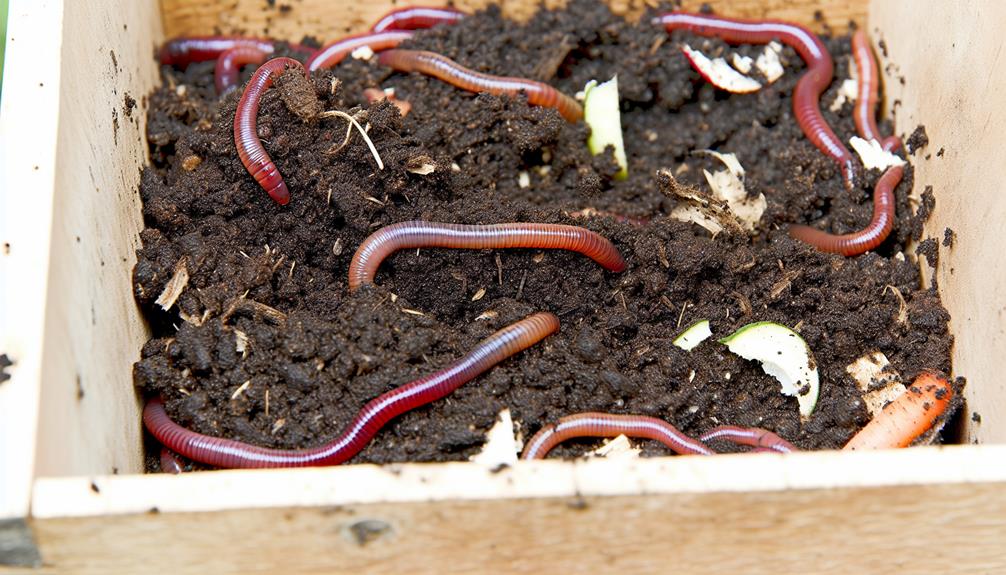
Start by checking moisture levels; the bedding should be as damp as a wrung-out sponge. Too wet, and your worms might drown; too dry, and they’ll dehydrate.
Consider using these bedding options to maintain proper moisture:
- Shredded newspaper or cardboard
- Coconut coir
- Peat moss
- Aged compost
- Leaves
Temperature is another essential aspect. Worms thrive between 55°F and 77°F. If it’s too cold or too hot, their activity slows down, and they could perish. Place your bin in a location where you can monitor and adjust the temperature as needed.
Maintaining the pH balance is equally significant. Worms prefer a neutral pH around 7. If the pH is too acidic or alkaline, it can harm your worms. Adding crushed eggshells can help neutralize acidity. Regularly check the bin for any foul odors, which might indicate an imbalance.
Also Read: Can You Compost Artichoke?
Common Composting Mistakes
Despite your best efforts to maintain worm bin health, it’s easy to make common composting mistakes that can hinder the composting process. One frequent error isn’t managing moisture levels properly. Your worm bin should be as damp as a wrung-out sponge. Too much water can drown the worms and cause foul odors, while too little can dry them out and slow down decomposition. Regularly check and adjust moisture by adding water or dry bedding as needed.
Temperature regulation is another essential factor. Worms thrive between 55°F and 77°F. If the bin gets too hot, especially in direct sunlight, worms can die. Cold temperatures can make them sluggish or inactive. Keep your bin in a shaded, temperate spot, and monitor conditions regularly.
Overfeeding is another mistake. It’s tempting to dump all your kitchen scraps, but excess food can lead to rotting and attract pests. Feed your worms gradually and observe their consumption rate.
Frequently Asked Questions
Can Worms Survive in a Compost Pile During Winter?
Yes, worms can survive in a compost pile during winter. You’ve got to provide worm insulation, like extra layers of leaves or straw, to help their winter survival. Your efforts guarantee they thrive, even in the cold!
How Do Temperature Changes Affect Worm Activity in Compost?
Temperature changes greatly affect worm activity in compost. Use insulation methods like straw or blankets to regulate temperature, ensuring your worms stay active. You’ll create a thriving compost community that benefits everyone involved.
What Types of Worms Are Best for Composting?
For the best composting results, choose worm species like red wigglers or European nightcrawlers. They thrive on a diverse worm diet, breaking down organic matter efficiently. You’ll feel part of a sustainable community by using them.
Can You Use Kitchen Scraps to Feed Composting Worms?
Absolutely, you can use kitchen scraps to feed composting worms. A worm diet includes various food scraps like vegetable peels, coffee grounds, and fruit waste. By sharing this practice, you contribute to a sustainable community.
How Often Should You Aerate a Worm Compost Bin?
You should aerate a worm compost bin every week. Use aeration tools to guarantee the best airflow benefits. This helps your worms thrive, keeping them healthy and happy while enhancing your composting efforts. You’re part of a sustainable community!
Conclusion
To wrap up, remember that worms play an important role in composting by breaking down organic matter efficiently. Monitor their health and lifespan to keep your compost thriving.
If a worm dies, it will naturally decompose, enriching the soil. Maintaining bin health is essential; avoid common mistakes like overfeeding.
If needed, explore alternatives to worm composting. With these tips, you’ll maximize the benefits of vermicomposting and sustain a productive composting system.

